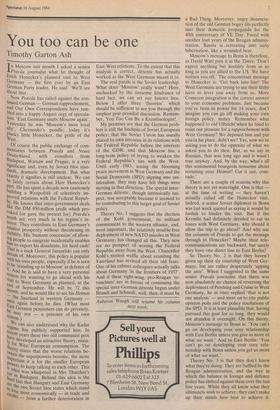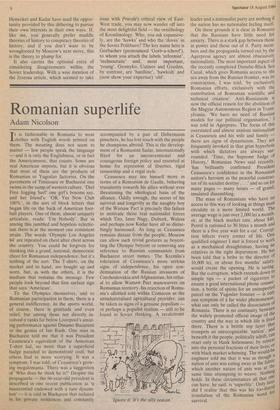You too can be one
Timothy Garton Ash
In Moscow last month I asked a senior Pravda journalist what he thought of Erich Honecker's planned visit to West Germany — the first ever by an East German Party leader. He said: 'We'll see about that. • • •' Now Pravda has railed against the con- tinued German — German rapprochement, and Our Own Correspondents have tum- bled into a happy August orgy of specula- tion. 'East Germany snubs Moscow again'. Yesterday he was 'Moscow's most loyal ally', Chernenko's poodle; today it's Plucky little Honecker, the pride of the West.
Of course the public exchange of com- mentaries between Pravda and Neues Deutschland, with crossfires from Budapest, Warsaw and Prague, is a very significant and, even by Soviet bloc stan- dards, dramatic development. But what exactly it signifies is still unclear. We can be fairly certain about Herr Honecker's Part. He has spent a decade now cautiously building a Westpolitik of selectively im- proved relations with the Federal Repub- lic. He knows that inter-government deals like the DM 950-million credit which pro- voked (or gave the pretext for) Pravda's wrath are very much in his regime's in- terest. They contribute to East Germany's relative prosperity without threatening its stability. His 'humane concession' of allow- ing People to emigrate incidentally enables hurl to export his dissidents, for hard cash! That is a trick General Jaruzelski can only dream of. Moreover, this policy is popular With his own people, especially if he is seen to be 'standing up to Moscow' in defence of it. And he is said to have a very personal reason for wanting to go ahead with his visit to West Germany as planned, at the end of September. He will be 72 this Month, and he would like to see his Heimat the Saarland in western Germany — once again before he dies. (What most East German pensioners can do privately, symay not — a prisoner of his own Stem.) re‘Ye can also understand why the Kadar ginle has publicly supported him. In recent years these two old communist pros lave developed an attractive theory, main- ly for West European consumption. The :°rY states that the worse relations be- ftleen the superpowers become, the more rowers it is for the smaller European rowers to keep talking to each other. This `e'an'hat was whispered in Mrs Thatcher's h,r in Budapest. Behind this idea is the ar4c1 fact that Hungary and East Germany to the two Soviet bloc states which stand creTse most economically — in trade and its — from a further deterioration in East-West relations. To the extent that this analysis is correct, détente has actually worked as the West Germans meant it to.
The real puzzle is the Soviet leadership. What does 'Moscow' really want? Here, unchecked by the tiresome hindrance of hard fact, we can set our fancies free. Below I offer three 'theories', which should be sufficient to see you through the amplest post-prandial discussion. Remem- ber, You Too Can Be a Kremlinologist!
My premises are that the German prob- lem is still the linchpin of Soviet European policy; that the Soviet Union has usually placed its own interests in its relations with the Federal Republic before the interests of the GDR; and that Moscow has a long-term policy of trying to weaken the Federal Republic's ties with the West. Until early 1983, seeing the blooming peace movement in West Germany and the Social Democrats (SPD) slipping into uni- lateralism, they may have felt things were moving in that direction. The special inter- German détente, though intrinsically sus- pect, was acceptable because it seemed to be contributing to this larger goal of Soviet policy. Theory No. 1 suggests that the election of the Kohl government, its militant commitment to the western alliance, and, most important, the relatively trouble-free deployment of new NATO missiles in West Germany, has changed all this. They now see no prospect of wooing the Federal Republic away from the West. Chancellor Kohl's tireless waffle about reuniting the Vaterland has revived all their old fears. One of his cabinet colleagues actually talks about Germany 'in the frontiers of 1937'. And if these right-wing, pro-Reagan 're- vanchists' are in favour of continuing the special inter-German détente begun under Brandt and Schmidt, well, then, it must be a Bad Thing. Moreover, angry denuncia- tion of the old German bogey fits perfectly into their domestic propaganda for the 40th anniversary of VE Day. Faced with another four years of the Reagan adminis- tration, Russia is .retreating into surly hibernation, like a wounded bear.
Moscow's message to Bonn is therefore, as David Watt puts it in the Times: 'Don't expect anything but hostility from us so long as you are allied to the US. We have written you off.' The concomitant message to Honecker is: 'Get back into line! The West Germans are trying to use their filthy lucre to lever you away from us. More • Comecon integration is the correct answer to your economic problems. Just because you've been in power for 14 years, don't imagine you can go off making your own foreign policy, matey. Remember what happened to old Ulbricht when he tried to resist our pressure for a rapprochement with West Germany? We deposed him and put you in his place, didn't we? Yes, now we're asking you to do the opposite of what we asked you to do then. But, as we say in Russian, that was long ago and it wasn't true anyway. And, by the way, what's all this sentimental bourgeois nonsense about revisiting your Heimat? Cut it out, com- rade.'
There are a couple of reasons why this theory is not yet watertight. One is that at the time of writing — they haven't actually called off the Honecker visit. Indeed, a senior Soviet diplomat in Bonn was last week quoted as saying it would be foolish to hinder the visit. But if the Kremlin had definitely decided to cut its losses with West Germany, why should it allow the trip to go ahead? And why use the columns of Pravda to get the message through to Honecker? Maybe their tele- communications are backward, but surely they have one direct line to East Berlin?
So Theory No. 2 is that they haven't given up their sly courtship of West Ger- many, but are rather desperately 'upping the ante'. When I suggested to the same senior Pravda journalist that there was now absolutely no chance of reversing the deployment of Pershing and Cruise in West Germany, he at once replied 'that is not our analysis' — and went on to cite public opinion polls and the policy resolutions of the SPD. It is at least plausible that, having pursued this goal for so long, they would not abandon it overnight. On this theory, Moscow's message to Bonn is: 'You can't go on developing your cosy relationship with East Berlin unless you give us more of what we want.' And to East Berlin: 'You can't go on developing your cosy rela- tionship with Bonn unless you get us more of what we want.'
Theory No. 3 is that they don't know what they're doing. They are baffled by the Reagan administration, and the way in which the balance in foreign and defence policy has shifted against them over the last five years. While they all know what they ultimately wish to achieve, they can't make up their minds how best to achieve it. Honecker and Kadar have used the oppor- tunity provided by this dithering to pursue their own interests in their own ways. If, like me, you generally prefer muddle theories of history to conspiracy theories of history, and if you don't want to be wrongfooted by Moscow's next move, this is the theory to plump for.
It also carries the optional extra of considering disagreements within the Soviet leadership. With a wise mention of the Izvestia article, which seemed to take issue with Pravda's critical view of East- West trade, you may now wander off into the most delightful field — the ornithology of Kremlinology. Who, you ask expansive- ly, are the 'hawks' and who the 'doves' in the Soviet Politburo? The key name here is Gorbachev (pronounced `Gorb-a-tchovf), to whom you attach the labels 'reformist', `technocratic' and, most important, `young'. Gromyko, Ustinov and Grushin, by contrast, are 'hardline', 'hawkish' and (now show your expertise) 'old'.







































 Previous page
Previous page